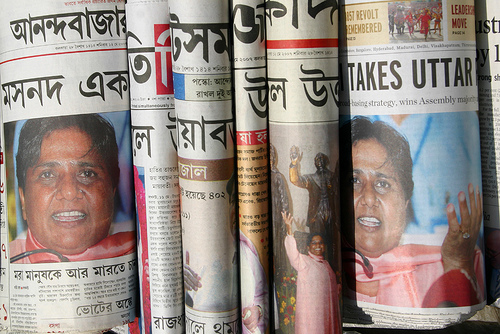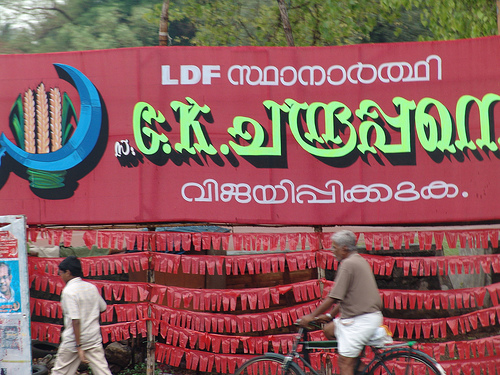It has been widely observed that the middle class in India doesn’t take part in the electoral process. As of this writing, I’m 26 years of age and have yet to meet a friend of mine who has voted, even though we could have done so almost ten times till now. Why does this happen?
After reading several articles on the net about the responsibility to vote, I am ready to do so for the first time. I want to vote. To not be partly responsible for the mess of politics that we’re in. After all, I have no business to complain if I don’t do at least this much.
Image Credit: counterclockwise

However, when I was trying to make a decision, I came across hurdles which seem insurmountable. Here was my experience:
Preparing to vote
Understanding the system
Don’t flame me when I say that my first hurdle was understanding how the democratic process in India works! After a lot of reading up, I have finally shed the misapprehension that state elections are somehow linked to central elections. This may sound dumb to you, but I never really knew what was happening, civics lessons notwithstanding – who remembers that stuff anyway? I know better now.
After reading the election commission’s website, I have understood that Chennai is divided into areas called constituencies, and that you have to vote for people who will represent your constituency. Once more, this has nothing to do with state elections which are separate. Now most of these guys in each constituency are members of a party. But in Chennai, the major parties are the DMK and the AIADMK which are state based. What if I want to vote for a national party like the Congress instead?
The lowdown is that these local parties (the DMK and the AIADMK) tie up with the national parties and thereby lend them support in coming to power. So if I want the Congress to come to power, I have to know which local state party is allied with them and vote for that one. Once the dust has settled, this alliance will choose someone to become the Prime Minister.
So now that all this is clear, it’s time to vote. Or is it?
Choosing a candidate – What I need to know first
So now I need to select which person should represent my constituency. To do this, I need to know the following:
- To which constituency do I belong?
- Who are the candidates for my constituency?
- What are the qualities of each candidate? Is he or she someone I would vote for?
- Which party do they belong to?
- If I have a particular party in mind that I want to come to power in the center, which state party has a tie up with that particular group?
Let’s go through them one by one.
Which constituency do I belong to? – Help me!
According to Wikipedia (the listing on Google when I search for “Indian Constituencies”), I see that Chennai is broken down into three constituencies. However, my area doesn’t seem to figure in any of them! I know it has to be one of them and that the list is incomplete, but I can’t be sure. So I look for areas that are close to my area and come to the conclusion that it must be “Chennai Central”. But I need to be sure.
No other website seems to give me the information as to which constituency I belong to. So the first step itself presents a barrier to me. But let’s assume that it’s “Chennai Central”.
Update (21st April 2009): Since I wrote this, several informative sites have come up, one of them being Jaago Re – an entity with links to Tata Tea. You can use their tools to get your constituency.
Who are the Candidates for “Chennai Central” – can I please know?
Google was less helpful here than for the previous question. But by trying various combinations, I came across two sites that gave me the candidates, but these were only for the previous election of 2004. I read that the parties have already nominated their candidates Chennai, and so the list must be available somewhere! The best I could do was at this site talking about Indian Elections, but even this didn’t give a comprehensive list. For example, at the given page, it only listed the candidates of 5 parties, none of whom apparently are contesting in Tamil Nadu. What about the local parties?
So where can I get a list of people whom I can vote for? If there is a source, please let me know. Bottom line, how can I vote when I don’t even know who the candidates are?
Update (21st April 2009): Sites like the Election commission website have started putting up searchable lists. Very useful!
Ascertaining the qualities of each Candidate – Where is your email ID?
Let’s move past this and say I have a list of candidates who are standing in my constituency. I don’t have a list, so I have to improvise. According to Wikipedia, a person called Dayanidhi Maran is the MP for Chennai Central from 2004. Now to vote for this guy, I would like him to support the same issues that I do as well as know a few things about him like:
- Does he have a criminal record?
- Does he support free speech irrespective of “religious sentiments” being hurt arbitrarily?
- Does he approve of the latest IT Amendment in Parliament? (I don’t)
- What does he feel about issues like Global warming and what is he going to do about it?
- What is he going to do about improving public transportation overall?
- Is he in favor of Article 377?
- Which way has he voted on various bills in the past?
Since these are general elections, his views on these mattes will affect the way he votes on bill that have a bearing on these issues. Ideally, I would like to know the above points about all the candidates who are standing. But how am I to ascertain his views? Where is a list of email ID’s of all the candidates so that I can ask them?
Image Credit: Bryce Edwards

Straight off the bat, I don’t speak Tamil, which is the language that the local channels of Chennai broadcast in. I don’t know if they interview the candidates (since the channels also have political affiliations), but even if they did, I wouldn’t understand a word. Do I not have the right to vote and make an informed decision if I can’t speak the language?
Bottom line – What are the candidates doing to reach out to people like me? If they don’t then how can I vote? Do they not want my vote?
Which party do they belong to?
I suppose if I could ever get my hands on an actual up to date list of candidates, that list would also give their political affiliation.
Which party does the local party tie up with?
And finally, I would need to know which national party (who is at the center) has a tie up with which local parties so that I can make an appropriate vote. This information I would presumably need to get from the news.
Conclusion – It’s a complete haze
Having gone through all of the above, I guess the main reason why I don’t vote and haven’t voted till now is that none of the candidates strike a cord with me. This could be simply because they haven’t reached out to tell me what they stand for. But unless they do that in a way that I can understand, I can’t vote for anyone.
People like me live on the Internet. As a writer, I hardly ever leave my house. For me to make a decision, each candidates needs to have a website in English, with updated information, their qualifications, preferably a blog and a forum where we can ask questions and discuss issues. He or she needs to have an email ID and complete transparency about what his views are and how he has voted previously in the cabinet if ever.
Till this happens, people like me are simply not going to vote at all, since we’re cut out of the entire process. Millions of us – votes for the taking with merely the effort to reach out. When will it happen?
Hi,
I understand your as well as other people's problem for choosing not to vote because we all are thinking whom to vote for. You might have to think whom to vote against.
There is very logical and simple, these netas doesn't want the common educated public to vote because we can change the mandate, that's why you still face problems in inclusion of name in ERO, voting, choosing the right candidate. They want that only uneducated, unemployed people vote for them , and in return they will get blanket or sari or meal or a desi-alcohal.
What we need to do now, the real urgency is to actually vote against all those candidates and parties, it might happen in the process that a wrong candidate or party got majority, but you again have a right to vote against those wrong after 5 years. The result of all these is that "we-the common man" can create a fear among all the politician that if they are not able to fulfill the promises, they will be thrown out of power. If we are able to create a atmosphere where these politician feel that they are no more than servants for indian citizens, they have a fear in mind that these janata can do anything if their welfare is not being taken care of, one day we will win, and if not you then your coming generations will be benefited by this.
Hope you got my point.
Good to see, you decided to vote.
@Deepak<span mlb_binding_key="28" idspanfor="LINK" mlb_idspanflag="true" style="border-style: solid ! important; border-width: 1px ! important; padding: 0px 2px ! important; overflow: visible ! important; font-family: arial,sans-serif; font-size: xx-small ! important; line-height: 130% ! important; -moz-border-radius-topleft: 2px ! important; -moz-border-radius-topright: 2px ! important; -moz-border-radius-bottomright: 2px ! important; -moz-border-radius-bottomleft: 2px ! important; margin-left: 2px; max-width: 20px; max-height: 10px ! important; float: none ! important; display: inline;">SI</span>
I agree. The power to cast a negative vote anonymously will be very good. Currently the matter is under discussion at the Supreme Court I believe.
Yes, that's a matter under discussion, and that will really take a long time to actually become possible, because after that it follows a bill to be passed in parliament, which this current politicians will try their best unanimously not to pass. But time is the one thing, they cannot deny.
Here's something to help you in your pursuit for information!
http://www.empoweringindia.org/new/home.aspx